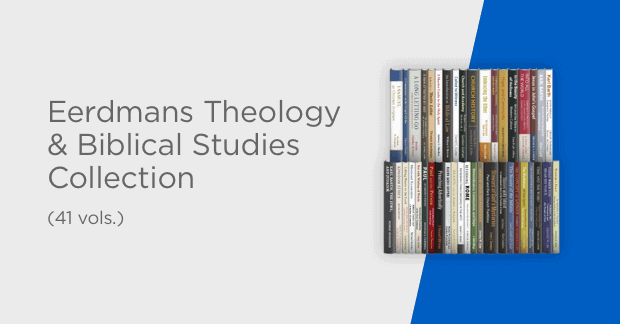We often think of beauty as a matter of taste. A concerto that moves one person to tears may put another to sleep. But what if beauty isn’t in the eye of the beholder? What if it’s rooted in the very nature and being of God?
In this excerpt from The Beauty of the Infinite: The Aesthetics of Christian Truth, David Bentley meditates on the power of the Christian understanding of beauty. Bentley writes that beauty is not subjective but objective—an indescribable gift God shares with creation to declare his glory and goodness.
The Beauty of the Infinite is part of The Eerdmans Theology & Biblical Studies Collection, 41 volumes of outstanding biblical theology, church history, hermeneutics, biographies, and more.
***
Beauty is objective.
This is asserted with neither any dogma nor any “science” of the beautiful in view; there is no objective thing that can be isolated, described, and quantified in the manifold of experience whose name is beauty. Nonetheless, beauty possesses a phenomenal priority, an indefectible precedence over whatever response it evokes; it appears on the vastest of scales and on the most minute, at once familiar and strange, near and remote; attempts to make it obedient to a particular semantics inevitably fail, and expand uncontrollably into an ever more inexact prolixity.
The beautiful is not a fiction of desire, nor is its nature exhausted by a phenomenology of pleasure; it can be recognized in despite of desire, or as that toward which desire must be cultivated. There is an overwhelming givenness in the beautiful, and it is discovered in astonishment, in an awareness of something fortuitous, adventitious, essentially indescribable; it is known only in the moment of response, from the position of one already addressed and able now only to reply.
This priority and fortuity allow theology to hear, in the advent of beauty, the declaration of God’s goodness and glory, and to see, in the attractiveness of the beautiful, that creation is invited to partake of that goodness and glory. So say the Psalms: “O taste and see that the Lord is good” (34:8).
Beauty thus qualifies theology’s understanding of divine glory: it shows that glory to be not only holy, powerful, immense, and righteous, but also good and desirable, a gift graciously shared; and shows also, perhaps, the appeal—the pleasingness—of creation to God.
In the beautiful God’s glory is revealed as something communicable and intrinsically delightful, as including the creature in its ends, and as completely worthy of love; what God’s glory necessitates and commands, beauty shows also to be gracious and inviting; glory calls not only for awe and penitence, but also for rejoicing; God’s ordinance is also ordonnance, so to speak.
There is also a moral element in receiving the glory of God’s work under the aspect of beauty: the beautiful fosters attachment that is also detachment, possession in dispossession, because it can be received only at a distance, only in letting be, as gift; where glory bestows itself as beauty, it consecrates otherness as good, and of God’s goodness.
All this said, however, the objectivity of beauty still does not make of beauty a particular object. The Christian understanding of beauty is analogical, in two senses: in the simple analytic sense, that whatever “beauty” means is grasped only by analogy, by constant exposure to countless instances of its advent, and through constant and continuous revision (this because, in theological terms, God is the “primary analogate” to whom beauty is ascribed); and in the more radically ontological sense, that beauty is not some property discretely inherent in particular objects, but indwells the analogical relationship of all things, each to the other, as a measure of the dynamism of their involvement with one another.
The Christian use of the word “beauty” refers most properly to a relationship of donation and transfiguration, a handing over and return of the riches of being.
***
Order The Eerdmans Theology & Biblical Studies Collection and get The Beauty of the Infinite —plus 40 additional volumes. And save 27% on this collection while it’s on pre-order.
Lock in your savings today before the product ships and the price goes up.
This excerpt is adapted from Hart, David Bentley. The Beauty of the Infinite: The Aesthetics of Christian Truth. Grand Rapids, MI: William B. Eerdmans, 2003.





